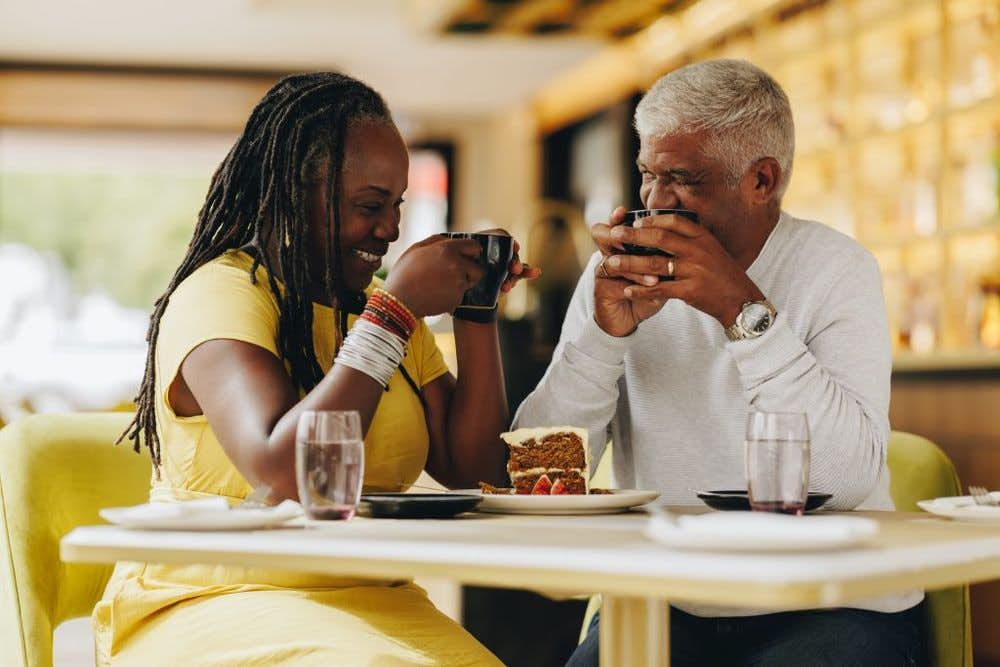February 8th, 2023

February is Relationship Wellness Month. When we think about healthy relationships, we often think about them in the sense of romantic relationships. Relationships can also refer to our friendships. Healthy relationships help us to grow and flourish.
We often hear about the "red flags" in relationships that should be seen as us running for the hills. We don't focus enough on the green flags or the signs of a healthy relationship.

1.) You feel secure- Security in a relationship can look different to different people, but it is often comprised of trust and honesty. When you feel secure, you are not worried about what the other person might to do betray you.
You don’t have to constantly sit on pins and needles wondering what they may be hiding from you. Security can take time to develop and is often developed through dependability.
2.) Boundaries are respected- In a healthy relationship, both individuals respect one another's boundaries. Healthy relationship boundaries include but are not limited to physical, financial, sexual, intellectual, and emotional boundaries. Each person is different and one person's comfort is not always the same as the other person's.
If someone says they do not feel comfortable with something- it is not your decision to decide if you agree with it or not. Respecting the other person’s types of boundaries can help make them feel safer in the relationship.
3.) You’re able to communicate clearly with one another- Communication in relationships can be challenging. There are four different kinds of communication styles- Passive, Passive-Aggressive, Aggressive, and Assertive. Everyone has their own way of communicating and may even have a mixture of multiple communication styles.
In an emotionally healthy relationship, there is a fair amount of assertiveness on both ends. Assertiveness entails expressing feelings clearly and directly. This can include instances where situations are difficult or uncomfortable. Assertiveness can help to minimize continuing conflict in a relationship.
4.) You support each other's interests- A relationship is comprised of two or more individuals. In most cases, the individuals in the relationship may not share similar interests or hobbies. For instance, your partner may be interested in going to sporting events, while you may be more interested in attending plays or going to the theater.
In a healthy relationship, it is important to recognize that you might not always enjoy everything the other person does – and that’s okay! There must be mutual respect for each person’s interests. Whether it be taking turns doing things that the other person may not enjoy as much or understanding that it is okay to do things separately sometimes too.
5.) Independence- Both persons in the relationship are two separate people that come together. You don’t feel the need to spend every moment with one another. You can do things by yourself.
You can see your friends and family without them and they can do the same. You aren’t constantly hovering over one another and allow each other space when needed.
You both recognize because you are two separate people, that not all of your goals may align but that the important ones will. It is important to understand that they should add happiness to your life but shouldn’t be your sole source of happiness.
6.) You Can Be Your Authentic Self - When you’re in a healthy relationship, you don’t feel the need to hide parts of yourself that you may think others wouldn’t like. You can be the person that you truly are.
You don’t have to worry about this person making fun of your insecurities. You understand that this person loves you despite these insecurities you may have and chances are – they may like the little things that you don’t like about yourself.
7. You Can Compromise- Let's be honest- at some points in our lives- we all want what we want when we want it. When you’re in a relationship, it can’t always be this way. A relationship is not always focusing on “me” but rather “we”. Each partner has to make sacrifices sometimes.

Whether it be changing plans because the other partner doesn’t feel like going out. Maybe it’s letting your partner pick dinner even though you don’t want what they’ve chosen. Or perhaps it’s coming to an agreement when you both have plans at the same time on what to do. In a healthy relationship, both partners are compromising.
How many of the characteristics above are present in your relationships? Every relationship is different and there may be things listed above that you struggle with, but it doesn’t necessarily mean your relationship isn’t healthy. In a particularly difficult situation, couples counseling can even help explore your relationship to find areas you can compromise.
There is always room for growth even in the strongest of relationships. Remember, this is not a comprehensive list, but a few key characteristics. Healthy relationships can help us to feel happier and less stressed.

Our Services
Virtual/Online CarePHP and IOPAdult PsychiatryChild & Adolescent PsychiatryAdult TherapyChild & Adolescent TherapyCouples CounselingFamily TherapyGroup TherapyPsychological TestingTranscranial Magnetic Stimulation (TMS)Resources
Refer a PatientCareersClinical Training OpportunitiesOur ProvidersFree Mental Health TestsCommonly Prescribed MedicationsLocationsBlogIn The NewsClarity Through CharityClarity for AllQuick Links
Patient PortalFAQsAccepted InsurancesContact us